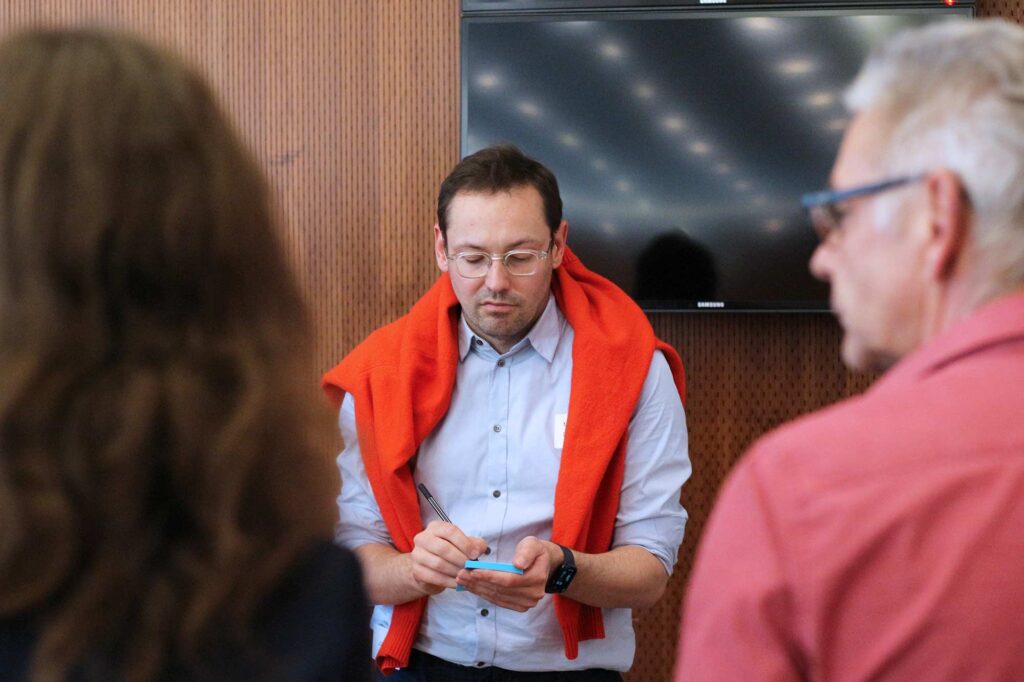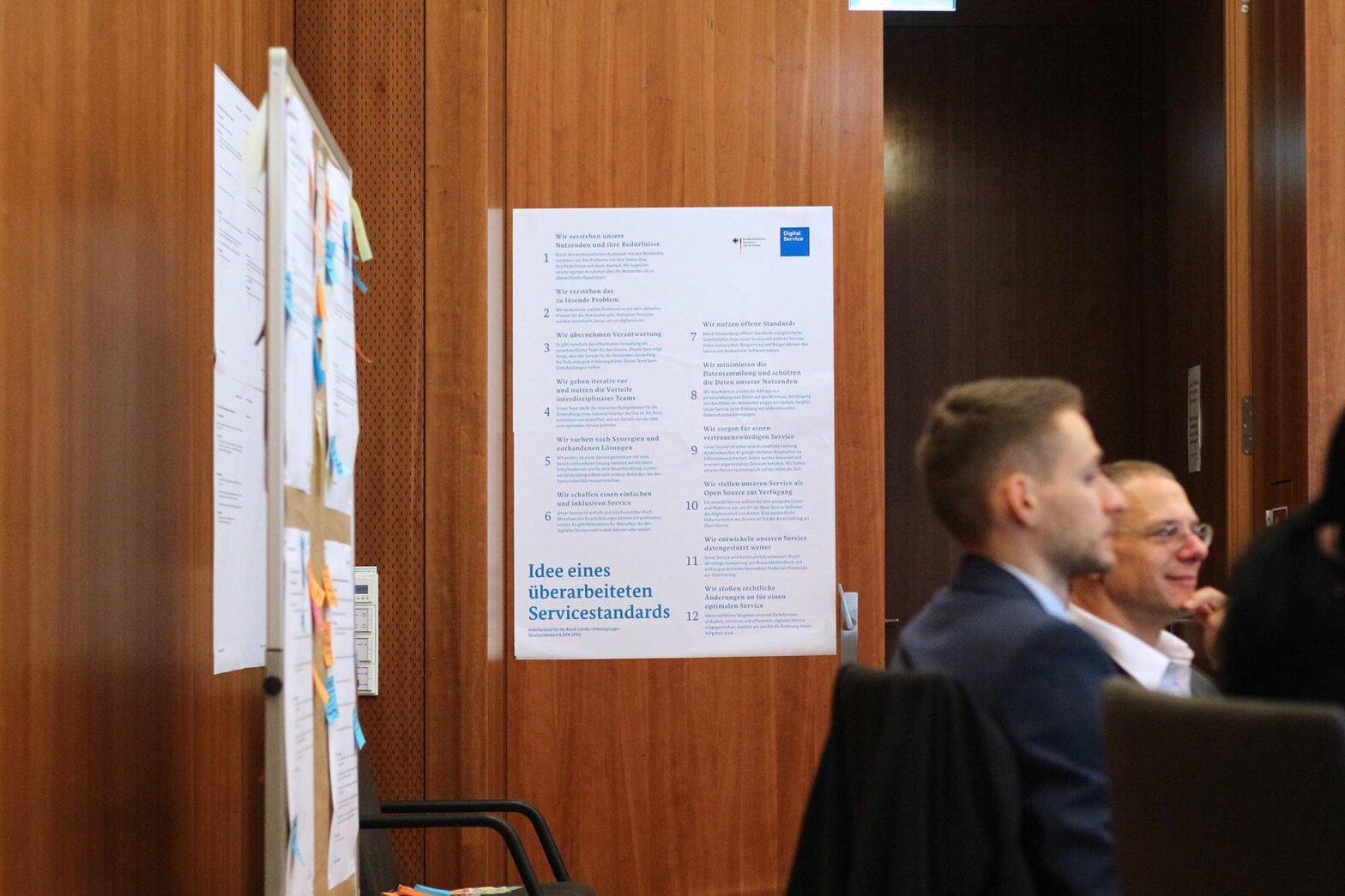We’ve come so far!
Just 2 years ago, no one could care less about the German government’s Service Standard. People told me it was a dead duck in the water and asked why I still cared about it.
Things could not be more different now.
Workshopping an updated Service Standard
In a 2-day workshop, we workshoped parts of the updated standard at the Ministry of Interior this week. Some 30 colleagues from all levels of government – federal, state, and municipality – and from many parts of the country joined to review the earliest draft.
After an introduction by the responsible deputy director and a context-setting recap, we jointly set rules for a ‘trust space’ through a 1-2-4-All format. Then, we broke out into 4 groups to review the newly written 12 standard points. These are part of the earliest pre-kick-off draft for DIN SPEC 66366.
After 48 interviews with subject matter experts and potential users of the Service Standard, the workshop cumulated the work that my colleagues Robert and Stefan have been doing since summer. Still, it’s just a starting point. The formal DIN process only starts in early November and has a tight timeline attached.
On Wednesday and Thursday, participants were asked to read the draft and put plenty of green, amber, and red dots on the sheets. They were invited to note their thoughts and mark what resonated with them, what needed further clarification, and what they disagreed with. Different groups had different dynamics. Some had plenty of green dots, while others had relatively few.
The group I led engaged in vivid discussions and used green dots sparsely. For some points, participants put red dots because they shared the view that the standard should be bolder. For others, they did not agree with each other. In the playback, though, my group noted that while having fierce debates, they saw no significant blockers to the progress of the Service Standard work. Other groups had similar feedback.

People expressed their gratitude for the well-prepared workshop, and transformation manager Alexander deserves the most credit for that. Three more workshops will follow in the coming few weeks, so there will be little time for rest.
On the evening of the first workshop day, some of us went out for dinner. It allowed me to catch up with a colleague from Hamburg whom I had not met before. They knew of my MBA thesis work, though, and so I got to hear how Hamburg’s Digital First team had progressed far beyond my expectations. They hired in-house service designers, established processes, and formally created the role of service owners. Various things I heard appear to be case study material worth of an updated service manual. So, once the standard has progressed, it will be worth investigating more.
Many setbacks are possible in the coming weeks. But it’s remarkable how far we’ve come, and I am confident we’ll get much further. The dynamic and right spirit is there.
Progressing on peer reviews
With meetings suddenly cancelled on Monday, Kannika and I worked on the Service Standard peer review report for the parental benefits calculator. Finishing a report should not take us over a month, but recently, that was the case, and I was a contributing factor.
With an additional session at the end of the week, we moved the report to the finishing line. Playing it back to the service team, we wanted to know if we got things wrong, missed things or if things were simply not comprehensible.
David from the comms team will finish it next week, and then we should be ready to publish it. That’s needed because the upcoming peer review is around the corner. In less than two weeks, we’ll take the first-ever look at an offering not created by Digital Service. As one of 18 federal digital strategy’s lighthouse projects, an all-new umwelt.info is in the works. With a sharpened proposition and rebuilt from scratch, it promises to be a search engine for environmental and nature protection knowledge.
We first met the team in the spring when they were part of the digital strategy’s user-centricity learn cluster. I was rather impressed with what they had done, mostly with in-house resources. They were the first time open and curious enough to agree to a peer review session. It took us a few weeks to find a time that works for all of us. Their service team is based in Merseburg, a few hundred kilometres away. Still, they insisted they would come to Berlin for an in-person peer review. Like the last round, we have a mixed panel. If things come together as planned, we might have up to 4 public sector organisations assembling the team of peer reviewers. That would be a pretty cross-cutting view. We will know in 1.5 weeks.
While preparing the peer review, Kannika and I also started writing about the journey of the past 16 months. I wrote the outline in a spare moment before meeting with our comms colleague Lutz. We plan to publish a blog post, missing reports, and new guidance on how to run a peer review in the second half of November.
Getting Service Gazette articles out
According to Kara, there was no other way. So, we created a LinkedIn page for the Service Gazette, too. We started publishing the first articles on Medium.com, but we need a replacement for Twitter to promote them.
It’s out. And gone in no time—wherever I place some copies. After 5 years, we made another English-language #ServiceGazette together with 16 people from all over the world. It captures a broad range of topics of what people work on. The first articles are now online: medium.com/the-service-…
— Martin Jordan (@martinjordan.com) October 25, 2024 at 2:31 PM
[image or embed]
I also shared more copies in person and will continue to do so in the coming days. All contributors should receive their copies in a few days.
What’s next
Next week, I’ll get the posters for our next public-facing meetup to the printer. I sketched and finished the design in a short evening. It’s not the most legible arrangement, but that should be fine. It’s only shown in a set context. On meetup.com, the graphic is shown right next to the title.
Our #Berlin #meetup is back! On 5 Nov, we will discuss ‘Filling the gaps’ and have exceptional members of civic society take the stage. Public sector organisations don’t always manage to do what people expect them to. Individuals fill those gaps. Sign up to join us: www.meetup.com/offentliches…
— Martin Jordan (@martinjordan.com) October 22, 2024 at 2:35 PM
[image or embed]
I’ve been looking forward to the topic ‘Filling the gaps’ and the speakers for some months.
Our event description says:
Public sector organisations don’t always manage to do what people expect them to. Sometimes, engaged members of civic society step in to fill the gaps. They develop offerings federal, state, or municipality governments could have created instead. Individuals or small teams then run and operate public services—in their personal time, without funding, and sometimes against the resistance of public bodies.
In our November meetup, we want to hear from a few engaged individuals who stepped in and responded to the needs of the public.
The event should be popular. Both Lilith Wittmann and Nicolas Bouliane have some fans and followers of their work. As always, we will record the talks but not the discussions.

